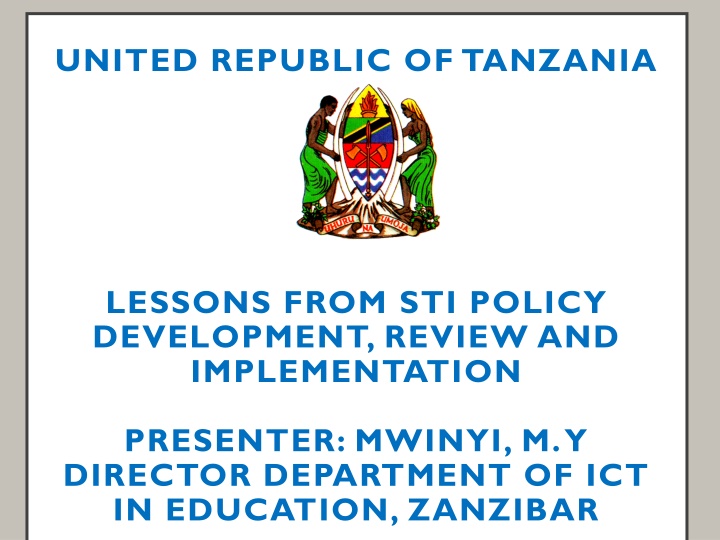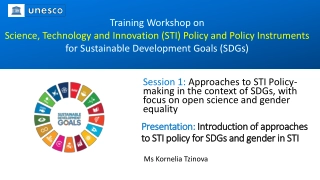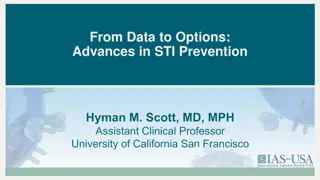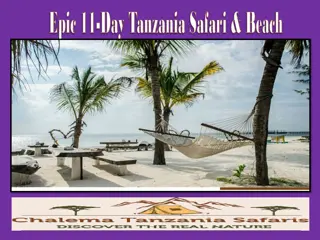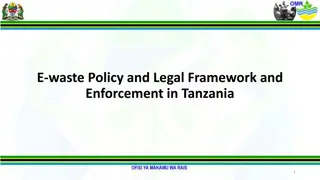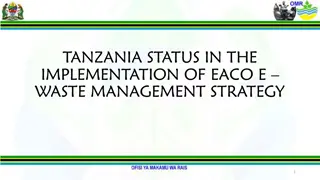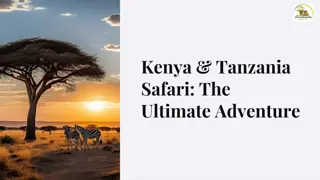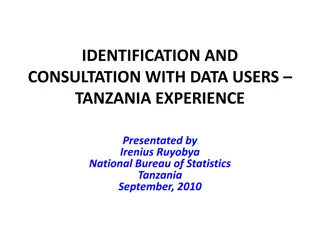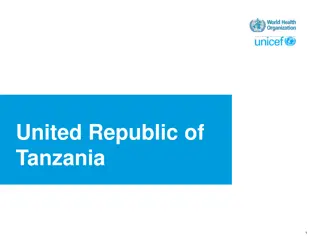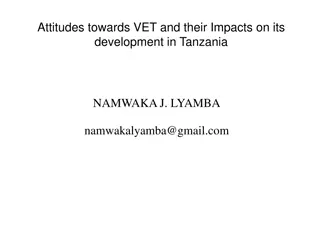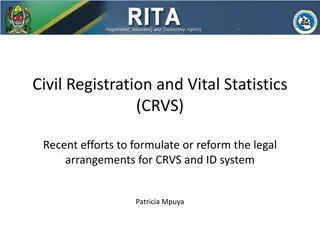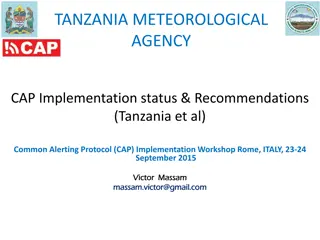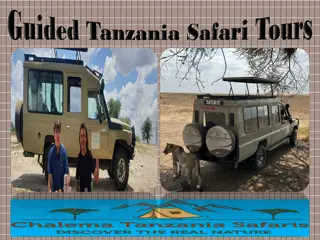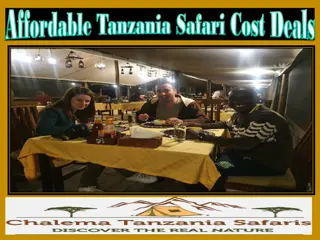Lessons from STI Policy Development in Tanzania
Science and Technology policies in Tanzania have evolved over the years, with a focus on areas such as innovation, implementation strategies, monitoring, and stakeholder engagement. The Science and Technology Policy of 1996 highlighted key areas for improvement in subsequent policies.
Download Presentation

Please find below an Image/Link to download the presentation.
The content on the website is provided AS IS for your information and personal use only. It may not be sold, licensed, or shared on other websites without obtaining consent from the author.If you encounter any issues during the download, it is possible that the publisher has removed the file from their server.
You are allowed to download the files provided on this website for personal or commercial use, subject to the condition that they are used lawfully. All files are the property of their respective owners.
The content on the website is provided AS IS for your information and personal use only. It may not be sold, licensed, or shared on other websites without obtaining consent from the author.
E N D
Presentation Transcript
UNITED REPUBLIC OF TANZANIA LESSONS FROM STI POLICY DEVELOPMENT, REVIEW AND IMPLEMENTATION PRESENTER: MWINYI, M. Y DIRECTOR DEPARTMENT OF ICT IN EDUCATION, ZANZIBAR
EVOLUTION OF SCIENCE AND TECHNOLOGY POLICIES IN TANZANIA Science and Technology has been an important agenda in Tanzania since 1961; and have evolved through the following: National Science Research Council (NSRC) in 1968 National Science and Technology Policy of 1985 National Commission for Science and Technology (COSTECH) established in 1986 National Science and Technology Policy of 1996 National Science, Technology and Innovation (STI) Policy (being finalized)
IN ZANZIBAR 01. Zanzibar Planning Commission (1984) 03. Zanzibar Fisheries And Marine Resources Research Institute (ZAFIRI) 04. Department Of Fisheries Development 05. Zanzibar Health Research Institute (ZAHRI) 06. Zanzibar Livestocks Research Institute (ZALIRI) 07. Zanzibar Agriculture Research Institute (ZARI)
THE SCIENCE AND TECHNOLOGY POLICY OF 1996 In the course of reviewing this policy, we revealed several aspects that needed to be redressed and/or considered in the new policy we are finalizing: Among others,these aspects were that: It did note include aspects of innovation It did not include comprehensive implementation strategy, which made implementation rather challenging It did not have a well structured and comprehensive M&E framework and plan,which made assessment of its implementation rather challenging the tracking of its
THE SCIENCE AND TECHNOLOGY POLICY OF 1996 Inadequately stakeholders across the STI ecosystem. This could have resulted understanding of the country`s STI ecosystem. The policy did not include mechanisms for linking-up and synergizing with closely related policies and other regulatory frameworks. scoped the roles of key from inadequate forms of legal and
THE SCIENCE AND TECHNOLOGY POLICY OF 1996 The policy lacks mechanisms and strategies for ensuring multi-stakeholder and cross-sectoral engagement in achieving thereof. In line with lack of structured M&E framework and plans, the policy lacked strategies for ensuring purposeful surveys/research for inform its implementation status and review the policy goals structured
THE SCIENCE AND TECHNOLOGY POLICY OF 1996 Low engagement of private sector during policy development,review and implementation Weak coordination of the STI ecosystem across different levels of governance Lack of resource requirements mapping for ensuring effective implementation of the policy Lack of higher level coordination and promotion of STI, which would simplify the intersectoral and inter-ministerial collaborations engagements and
BENEFITS OF UNESCO-SIDA- PROJECT FOR STRENGTHENING STI POLICIES AND SYSTEMS Tanzania is in currently finalizing its new policy `The National Science, Technology and Innovation (STI) Policy This policy has addressed and/or redressed most if not all shortcomings of the previous policy The improvements therein have among others benefited from the STI Systems strengthening project in many respects:
BENEFITS OF UNESCO-SIDA- PROJECT FOR STI SYSTEMS STRENGTHENING The Country`s STI stakeholders mapping report, which has among others helped defined roles across different stakeholders as well as recommending mechanisms and strategies for promoting the engagement of key stakeholders across the STI ecosystem Also, the in-depth understanding of the STI ecosystem has enhanced the development of Policy supportive instruments National Innovation Framework notably the
BENEFITS OF UNESCO-SIDA- PROJECT FOR STRENGTHENING OF STI POLICIES AND SYSTEMS Baseline institutional and financing frameworks: The gaps revealed therein have been addressed in the new STI policy in view of ensuring supportive legal, institutional and financing frameworks The STI needs assessment: has also enabled us identify several critical gaps that have been addressed in the current policy report on STI policy, legal,
BENEFITS OF UNESCO-SIDA- PROJECT FOR STRENGTHENING OF STI POLICIES AND SYSTEMS Training Observatory Tool in Science Policy and Instruments: The lessons underlining the key recommending mechanisms/strategies for ensuring robust systems and tools for regular STI data collection and reporting across the ecosystem Also, the new STI policy benefited directly through the financial support consultation meetings in Tanzania Mainland and Zanzibar Workshop on UNESCO Global were indicators useful in STI and during multi-stakeholder
